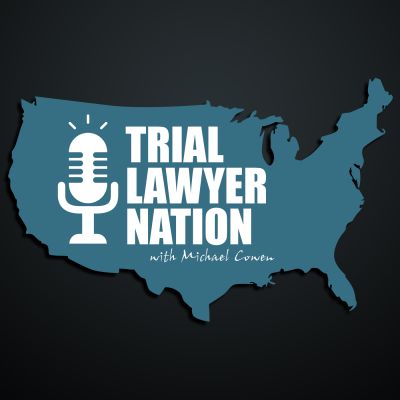Michael Cowen, and his guests, explore critical topics distinctive to the legal profession - specifically focusing on developing extremely efficient law practices, securing a competitive edge in the industry, and wildly excelling in the courtroom.
https://triallawyernation.com/
48 – Andy Young – Driving Change and Verdicts as a Truck Driving Lawyer
In this episode of Trial Lawyer Nation, Michael Cowen sits down with Ohio attorney, Andy Young, who like Michael, specializes in trucking cases.
Andy’s journey over the past 20 years of practicing law and ultimately specializing in trucking cases started by accident when his hobby for rehabbing trucks, as well as starting a trucking company, turned out to be more valuable than he expected where he was being asked to speak at various trucking litigation groups. Essentially his passion for “anything on wheels” and his upbringing around big equipment propelled him toward the industry as well. He goes on to establish upfront that he indeed does not hate the trucking industry as some might conclude by having become a trucking attorney. Andy cares deeply for the truck drivers as well as the component of the industry that treats the drivers well while also explaining in great detail the parts of the industry he does not care for, which abuses the drivers and stokes safety issues all in the name of profits. He goes on to say that everything he does “ultimately is in favor of safety and in favor of the truck drivers too.”
Beyond filing lawsuits to try and improve the trucking industry, Andy is also involved in several advocacy efforts having originally become involved through some articles he had written and published back in 2011 on underride crashes, which have evolved all the way through giving testimony to Congress on the issue. He talks through some of the efforts that he’s been a part of in shining a light on the issues that surround truck crashes, specifically underride guards and rear guards, where the industry has made significant strides to reduce fatalities from crashes involving underrides in Europe, but continue to lack in the United States. While Andy has started to see the needle move a little bit in regards to instituting safety features that would prevent such fatalities, he also sees the trailer manufactures resist the urge to make their products safer while using federal regulations as a scapegoat for not making these life-saving improvements. This transitions into Andy sharing how helpful it can be for the families who have lost a family member to a truck crash to become active in safety advocacy as a way to give them some purpose to their loss.
Michael asks Andy, with his unique perspective as a truck driver and running a trucking company, what he’s learned to make him a better trucking lawyer. Undoubtedly, Andy refers to his time behind the wheel as being the most valuable and suggests that those who are looking to be great trucking lawyers do what Michael Cowen did and go to truck driving school to get a more intimate understanding of what truck drivers experience as well as a better understanding of what it’s like to maneuver such large pieces of equipment. Andy also continues to use his truck driving skills as a part of a small race car team where he drives the truck that carries the car and finds himself constantly thinking about his cases every time he gets behind the wheel. This has allowed him to more effectively communicate with truck drivers better and understand things that perhaps other attorneys might not consider. He goes on to describe several examples of how this has come in handy citing personal experiences that have helped him to debunk some theories placed on truck drivers in cases when it comes to the speeds they travel at in relation to what gear they are in, which he notes has “been very, very beneficial.”
The conversation shifts to Andy discussing his great results in the face of some fairly tough fact patterns, where Andy goes into detail regarding his litmus test on how he decides whether to take on a case. It’s worth noting that he does not think it matters whether his client has hit the back of a truck, has had a DUI, were speeding, or had some other issues going on. Instead, he looks at the truck driver and the truck company to see if they created a hazard whe...
